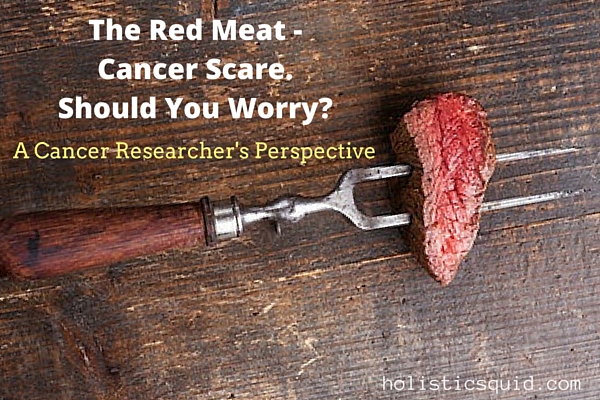
I'm a huge advocate of knowing the source of your meat, so when the recent WHO study came out regarding the red meat cancer connection, I assumed that it only applied to unhealthy CAFO meats. Many of my patients and friends, however, took the media coverage to mean that the red meat was indeed a real threat.
In this post, Natcha Maithai – a cancer researcher and nutritionist – breaks down what this study REALLY says (not the media) so that we can make up our own minds about enjoying great steak. ~Emily
In October 2015, the World Health Organization published a report in Lancet Oncology titled “Carcinogenicity of Consumption of Red and Processed Meat.” This study took the internet by storm, and was largely misinterpreted by the media since it distilled down to, “Red Meat Causes Cancer.”
As a cancer researcher and an evidence-based holistic nutritionist, I feel compelled to clarify the WHO's actual message and recommendations, as well as discuss related scientific evidence before giving my own recommendations in a way that is as unbiased as possible. First, I’ll explain and evaluate the study. In part two of this series, I’ll write about my recommendations with respect to how to eat red meat and prevent cancer.
Red meat has been associated with cancers and several other negative health outcomes for decades.
There have been numerous studies in this topic, so this is nothing new.
This Lancet Oncology article was a meta-analysis, which took studies that have been published in the past, and re-analyzed them. They concluded by categorizing red meat and processed meats as “class 2A” and class 1 carcinogens.
What makes this red meat cancer study credible?
This study was published in Lancet Oncology, which is a very prestigious and high impact medical journal. It was written by the International Agency for Research on Cancer (IARC) committee of the World Health Organization, which is a diverse group of researchers in terms of field of interest and country of origin. Therefore, it’s considered highly credible because it’s written by a prestigious organization and published in a prestigious journal.
What did the study actually say?
First, the authors (IARC committee) stated that red meat is a nutritious food. Then, they discuss how cancer-causing chemicals arise when we cook or process meats. They claim that they examined over 800 epidemiological studies to investigate the association of cancer with consumption of red and processed meats.
While red and processed meats have been associated with several types of cancer, the evidence is strongest for colorectal cancer, with about 17% increased risk per 100 gram of red meat and 50 grams of processed meats.
Based on the data, the committee largely concluded that there is sufficient evidence to say that processed meat may cause cancer, but not for red meat as the evidence was rather mixed. Several epidemiological studies showed positive associations for red meat, but a number of them did not. The authors stated that other confounding factors like diet and lifestyle risks may result in the observed associations rather than red meat consumption itself.
Here's a direct quote from the study:
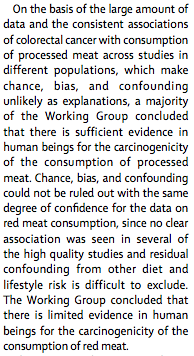
Consumption of red meat appears to increase mutations or switching off of the gene called APC, which is often found in colorectal cancers. It is also found to increase oxidative status in mice and humans. Therefore, mechanistically, they couldn't say that red meat doesn't cause cancer, either.
With all of this evidence of over 800 epidemiological studies and several other mechanistic studies, the IARC committee classified red meats as “probably carcinogenic to humans” (Group 2A), and processed meats as “carcinogenic to humans” (Group 1).
What this study did well, which made them more credible
They authors were very balanced and unbiased. They clearly wrote the article to state both sides of the evidence and not to mislead the readers. The committee declared no financial conflict of interest and appears to have no agenda.
They couldn’t be fairer with their reviews of the literature. I was surprised to find in this article that they actually did not say that red meat causes cancer (in contrary to what some media said). Instead, the article stated that due to the mixed nature of the epidemiological evidence, there is not sufficient evidence to say that red meat causes cancer.
Flaws of this study
Because it’s a meta-study, they had to rely on the previously published studies and the data that was available for them to review. There's a few problems with this. First, most of these studies were based upon epidemiological evidences – this means they studied the health of those in defined populations, along with the correlation between their consuming red meat and the incidence of disease. The problem is that simply because the correlation exists between red meat consumption and a disease does not mean that red meat consumption caused the disease.
Secondly, these studies were also based on self-reported food consumption, which is often not accurate. Not only did many of the studies rely on self-reported red meat consumption, several studies relied on self-reporting of food consumption years back into the past rather than actually analyzing food journals. These results can be influenced by personal bias, as well as other potential confounding factors, e.g. people who consume a lot of red meat often lived an overall less healthy lifestyle with less vegetables, less fiber and less exercise.
In addition, the mechanistic evidence that supports red meat consumption often comes from the evaluation of isolated chemicals or red meat on its own, rather than in a context of a healthfully diverse diet of a human. Evidence is clear that chemicals caused by overcooking or processing meats, regardless of whether the meat is conventional or organic, can and do cause cancer. However, we don’t eat red meats alone. In fact, studies show that chlorophyll in vegetables and other compounds in cruciferous vegetables can offset the cancer-causing effects of these chemicals in red meat (source and source).
In the field of epidemiology, the effects of red meat appear to be much smaller than other things that actually cause cancer. For example, when statistical associations indicate that red meat causes cancer, the risk is usually around 1.1 to 1.5 times those without red meat consumption. Whereas cigarette smoking, which has been conclusively shown to cause cancer, had risks up to 30 times those who did not smoke.
Interestingly, a member of the IARC (Klurfeld DM) claimed in another review article that confusing this small increase in statistical risks for cause and effects has previously caused the field of nutrition to make unfounded recommendations regarding low fat diets, breast cancer, and heart disease.
So should you worry about the red meat cancer connection?
Whether or not the red meat cancer connection is an issue for YOU largely depends on what you eat with your red meats as well as your surrounding lifestyle. The evidence of this particular study is rather inconclusive. Studies can be misinterpreted when one attempts to translate that into lay terms, and the general public may not be familiar with the nuances of interpreting scientific research.
We see this often as studies are misquoted in the media, which is the one issue that I am very passionate about addressing. This study on its own did not warrant the red meat cancer scare, and there are things we can do to ensure that your red meat is safely nutritious, rather than detrimental.
In my next article, I discuss some basic cancer prevention guidelines for red meat eater.
Read it here.
Natcha Maithai is a cancer researcher turned “health detective.” She helps investigate hormonal problems for her clients and demystify relevant biomedical research for the general public. She is passionate about helping women become masters of their bodies through fitness, nutrition, hormone balancing, functional medicine and quantified-self technologies. Find her at natchamaithai.ca.



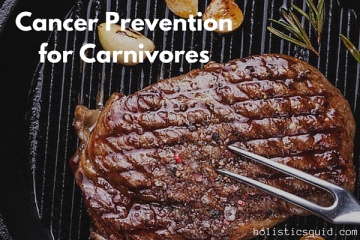
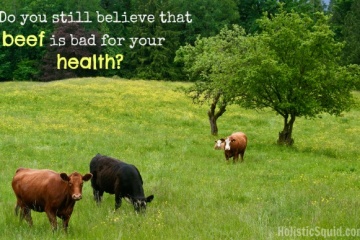
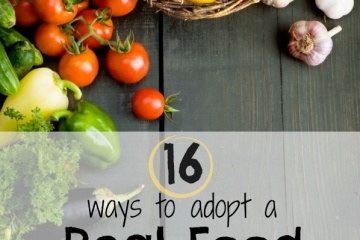



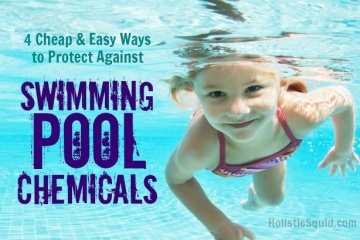

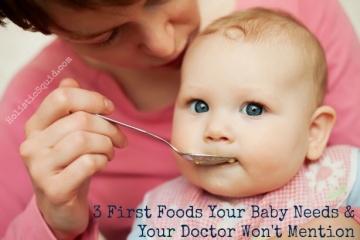
Never Though eating Red Meat is so worrysome.
Thanks for such an insightful post.
From now on, we are going to be focussing on the source of meat.
Thanks Lavanya. Glad this was helpful.
Ideas can so easily go viral these days, and it really does take so much time to sift through all the “noise”. Without a medical background, reading a medical journal and understanding it would take me a lot of time. This article was very well written. I do feel a bit better about eating red meat now.
Thank you Beesan. You want to make sure you get organic, and pasture-rased meats. I’m glad this is helpful.
I had actually forgotten about this. We usually eat chicken, however, I just found out that I am actually allergic to chicken, but not to beef or pork. I don’t know how to cook beef since I never have, but it looks like I’ll be learning! Luckily, we have a local place to buy good quality beef.
Sorry to hear that you became allergic to chicken, but it’s awesome you are trying out great sources of beef and pork, Kathy! Beef and pork are great, nutritious, foods, too. They are quite simple to prepare, actually.
I can’t agree with you on pork for this reason. 2) Weston A. Price Foundation:
“The results suggest that unmarinated cooked pastured pork may be unique in producing these coagulation effects on the blood, which also appeared quite rapidly, in less than ten minutes after blood draw, and did not clear up during an hour of observing the blood under the microscope.”
3) Dr. Olympio Pinto:
“On videotape, Dr. Olympio Pinto has recorded changes occurring in red blood cells caused by eating pork, smoking cigarettes, drinking caffeine, exposure to other toxic chemicals and heavy metals, or consuming any number of other potentially health-destructive substances. Just one hour after eating pork, for instance, more than half of the red blood cells began a transformation called “ghosting”. Ghosts are red cells that have lost their hemoglobin. Hemoglobin is not only an oxygen-carrier but is also responsible for the red pigmentation of the blood. This could explain the sleepy feeling some people get after eating certain kinds of foods to which the body is particularly sensitive. “
Thanks for the comment, Bruce. I have a lot of respect for the Weston A. Price and I apply several of their wisdoms to my lifestyle. I’m not familiar with live blood cell analysis so I need to do a little more research into that.
Red blood cells have lifetime of about 120 days, more or less depending on the person and nutrient status etc. Many people do feel sleepy after eating, which can also be because of poor digestion and insulin resistance. One thing that can absolutely occupy hemoglobin and render it no longer able to carry oxygen is carbon monoxide, because carbon monoxide binds to hemoglobin much more strongly than does oxygen. The known danger of carbon monoxide from that effect is that enough of it will kill people in minutes, which is why we have carbon monoxide detectors in houses and cars.
nicely researched and explained! – points out a lot of the questions i tend to ask when reading “a study” –
basically, every thing in moderation will be fine, especially red meat from happy animals 🙂 it is more the gluttony of our time that leads to all kinds of diseases (besides the chemicals in air and water, the growing pollution….) just my hunch.
thanks for the write up!
Thank you GB. 😀
I”ve had some mild concerns about it that have been compounded by the drought here in California that inspire me to choose other protein options more – so now we’re eating more ground turkey and having beef less regularly.
But what I’d love to hear a bit more about is the concern with processed meat and what qualifies as such – my family loves sausages and lunch meat and bacon and I only buy hormone-free and antibiotic-free options that claim to be “minimally processed” and we get “uncured” bacon. What about the processing is problematic? Should we be avoiding any meat products that are packaged and clearly altered (like hot dogs)?
Thanks!
In principle, perhaps 100% grass-fed beef and pasture-raised poultry should be more environmentally friendly than its grain-fed counterpart. I need to do some more research into how much water livestocks take in California. 😀 Interesting thing to think about.
Meats that have been exposed to smoke will have more carcinogenic substances in it. I can’t tell for individual brands or products, just in general I now choose fresh over deli meats. It sounds odd but liquid smoke may be less carcinogenic than real smoke. Fresh sausages should be okay if they are not smoked and not cooked in ways that will generate carcinogenic substances. Cooking in open flame tend to generate cancer-causing substances on foods.
Thanks for your post – very insightful. I grew up in an era where red meat was the norm, with chicken and fish being the “occasional”. My mom died of colon cancer at the age of 49. Red meats should not only come from pasture-raised animals, but also those that are pasture-finished; often times, those that are just pasture-raised are sent to a farm in their last month of life to be “finished” on grains to fatten them up prior to slaughter, We cook our meats on low temperature, and eat them as rare as we can. .
Thanks, Gail. Sorry to hear about your mom.
Now I find that if I try to only eat pasture-raised beef, pork or poultry, or wild-caught fish, it is hard to find chicken and fish except for certain times of the year.
I’m working on the next cancer prevention post as a follow up to this post, which should be helpful. Remember to eat lots of vegetables and regularly get screened as your doctor recommends, too.
Wonderful clarifications. Appreciate your insight.
How can I make sure to see & read part 2 of this article? Would prefer not to leave to chance to see the post from Weston A. Price as I found this one?
Thanks RoseAnne. How about subscribing to the newsletter at the top right hand corner of this page? Just click the bright pink subscribe button.
I do know that you need to have Vit B6 and magnesium to process the amino acids so kudos for including ” eat lots of greens “.
Thanks Santo. Yes, vitamin B6 and magnesium are very important, as well as other micronutrients. 😀
As you rightly say, correlation doesn’t mean causation. People who eat red meat undoubtedly also eat plenty of sugar, starchy carbs, wheat and grains, processed oils & fats, chemicals, non-organic foods laced with pesticides, fungicides & fertilisers, etc. Unless the studies were done on people who ONLY eat red meat and drink water (and there are some – actually very healthy – around that do), the plethora of variables make it impossible to place any blame on any one type of food.
Suggesting that any food may be an issue when it is not eaten in isolation and there are no obvious symptoms from eating it (such as there often are in those who eat wheat/gluten) is veering down the erroneous ‘fat makes you fat, causes heart disease & drives up cholesterol’ assumptions pathway driven by Ancel Keys and his total conviction that fat was the very devil to be avoided at all costs and spawned the following 60-year low-fat ‘craze’ that has had the very opposite of lowering obesity, driving down heart disease and dropping cholesterol, and into the bargain triggering an epidemic of gallbladder issues as under-utilised gallbladders clog up with stagnant bile and atrophy.
Throwing ALL meat into a bucket and pronouncing it carcinogenic is like pronouncing ALL humankind evil because of the actions of some. There is a world of difference between sustainably produced grass-fed organically pastured free-range animals and animals fed commercial feed, given antibiotics and other drugs and raised in feedlots. Both are red meat, yes, but the benefits of the former far outweigh the latter.
Healthy people need healthy food. And sadly, that is VERY hard to find and afford in this twisted system……..
Thanks, Ali. I agree. Thankfully we are changing the food industry. Consumers like us. We are turning this around. 😀
Thank you for your interesting article.
I am 74 years old and have been eating more than my large share of red meat mostly blue beef and often very lean raw mince on toast with a raw egg yolk since my arrival in Australia March 8 1995. My preferred meat has been grass fed and or organic. As I was used to smoked fish and meat in Holland I have kept that up, but it’s hard to get at times.
My health has been good so far and I do not depend on drugs prescribed or otherwise.
I think colorectal cancer like many others are dependent on emotional states as well as possibly taking chemical medicine, not to forget self neglect due to possibly may uncontrollable circumstances.
That’s great, Mia. Thanks for your comment.